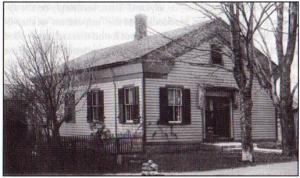Abby Spoke Here

Well I remember the wonder with which, when a young girl, I looked upon Abby Kelly[sic], when she spoke of the wrongs of black women and black men. - Matilda Joslyn Gage, Fayetteville, NY (1826-1898)
Life is short. Let us hasten to say what we believe men need to have said, even though we shall be hated for saying it. - Gerrit Smith (1797-1874) on 14 April 1861
The wisdom of Gerrit Smith’s words at age 64 should resonate in each of us. Reformers throughout history have lived by these words—affecting not only those in their audience and those who read or heard their ideas from others—but those of us who “hear” them over a hundred of years later. Each new generation “hears” Abby’s words of equality through the continuing efforts of the Worcester Women’s History Project. Abby’s recognition in the National Abolition Hall of Fame and the National Women’s Hall of Fame (NWHF) continues to reach new audiences.
On a recent visit along New York’s Freethought Trail, we could visualize 19th century women and men of Worcester spreading ideas across the country and across the generations. It was easy to see history as a relay race with each generation inspired and driven toward a more just world where every human would be able to use their skills to carry the baton forward to the best of their ability.
Young housewife and mother Matilda Joslyn Gage said, I saw the reports of the first convention [1850 first National Woman’s Rights Convention in Worcester, MA] in the New York Tribune, I knew my place; and when I read the notice of a convention to be held in Syracuse, in 1852, I at once decided to publicly join the ranks of those who spoke against wrong.
Lucy Stone and Samuel May encouraged Gerrit Smith, Elizabeth Cady Stanton’s cousin, to attend the 3rd national convention in Syracuse. This convention was known as the bloomer convention because Gerrit’s daughter Elizabeth Smith Miller, designer of the “bloomer” costume, and several other reformers wore the more comfortable mode of dress.
Temperance activist Susan B. Anthony said she had been inspired into action by reports of Lucy Stone at the 1850 convention and later worked closely with Elizabeth Cady Stanton and Gage in the National Woman Suffrage Association (NWSA). It is interesting to study how Lucy and Susan were at odds over suffrage for black men and how Matilda and Susan were at odds over reconciliation between the NWSA and Lucy’s American Woman Suffrage Association in 1890 to focus on the goal of gaining the vote for women to empower them to achieve equality. This historic lesson shows that reformers do not necessarily agree on the tactics and strategies to achieve their goal, but eventually realize the need to join forces to win the desired prize. Even Abby and Gerrit Smith disagreed on using politics to end slavery. They could still be friends, or at least distantly polite, and agree to disagree for the moment—a good message to send today’s Congress.
At the NWHF we “heard” Gray Panther founder Maggie Kuhn’s message (1905-1995) to Leave safety behind. Put your body on the line. Stand before the people you fear and speak your mind--even if your voice shakes. When you least expect it, someone may actually listen to what you have to say. Well-aimed slingshots can topple giants. And do your homework. The wisdom of experience is as important as the energy and new perspectives of the younger generation to move the ball forward. It took the combined efforts of the more traditional National American Woman Suffrage Association and young radical “Iron Jawed Angels” of the National Woman’s Party to achieve the vote for American women in 1920.
…And the longest American crusade continues against gender bias!
Learn more:
Dann, Norman K. Practical Dreamer: Gerrit Smith and the Crusade for Social Reform. Hamilton, NY: Log Cabin Books, 2009.
Iron Jawed Angels. HBO Home Video, 2004. http://iron-jawed-angels.com/.
Maggie Kuhn. National Women’s Hall of Fame, 1995. http://www.greatwomen.org/women-of-the-hall/search-the-hall/details/2/95-Kuhn.
Sterling, Dorothy. Ahead of Her Time: Abby Kelley and the Politics of Antislavery. New York: W.W. Norton, 1991.
Wagner, Sally Roesch. She Who Holds Up the Sky: Matilda Joslyn Gage. Aberdeen, SD: Sky Carrier Press, 2002.

